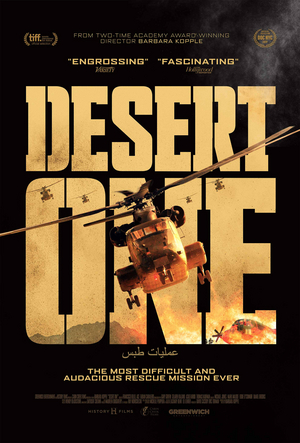By Glenn Dunks
 Barbara Kopple’s new film is an interesting one. But not necessarily for any reason related to style or form and potentially completely by accident. Rather, it’s interesting for how well it encapsulates America’s idealised image of itself. For Desert One is a documentary that charts the various ins and outs of a top secret military mission that was, to be perfectly frank, an utter shit show. A botched rescue attempt in 1980 of American hostages in Tehran that, in retrospect, was lucky to take off in the first place.
Barbara Kopple’s new film is an interesting one. But not necessarily for any reason related to style or form and potentially completely by accident. Rather, it’s interesting for how well it encapsulates America’s idealised image of itself. For Desert One is a documentary that charts the various ins and outs of a top secret military mission that was, to be perfectly frank, an utter shit show. A botched rescue attempt in 1980 of American hostages in Tehran that, in retrospect, was lucky to take off in the first place.
It’s in part because of this debacle that we got Argo.
And yet…
And yet, Kopple is a whiz at really knuckling down on the concept of so called “America” including in her two Oscar-winning films Harlan County, U.S.A. and American Dream. In a quite fiendish trick, Kopple finds a way to make Desert One a rousing film that ultimately works as a symbol for American imperialism. It makes patriotism out of the rubble of abject failure. One just needs to look at American history, most notably the south and the Civil War, to see how a deadly loss isn’t enough to stop the wheels of flag-waving jingoism turning.

The mission was Operation Eagle Claw in which then President Jimmy Carter finally ordered a rescue mission of American hostages in Iran after peaceful talks failed. The mission involved eight helicopters, a sandstorm, a few explosions, one unexpected bus and a presumed empty landing space outside Tabas code named "Desert One". It was here that the thoroughly planned assignment collapsed. If, like me, the more complex details of the story are new to you then I wouldn’t dare spoil them; if this weren’t real life, you would swear it was a story invented by a dark satirist!
Kopple is a filmmaker who made two documentaries over 14 years and won Academy Awards for both of them, but who has become extremely prolific of late. Whether it is musical biopics (Miss Sharon Jones!), true crime (A Murder in Mansfield) or transgender coming out stories (This is Everything: Gigi Gorgeous), she can usually find something in her subjects that speaks to the greater world around them. In this case, whether it was intentional or not, she’s found something that speaks to a growing unease or discontent towards the way America writes its own history, something that the more global world of today has only really just begun to process.
Desert One isn’t an attack on America, though. Certainly not to the degree of, say, her Dixie Chicks doc Shut Up & Sing, which was angry on behalf of and alongside its subject—and rightly so. Or at least it’s not an attack in the way people may wish or expect. Interviews with surviving mission members and their family as well as previously unheard phone conversations between Carter and military command really do emphasise the human toll this tragedy took on those involved and the effort that went into rescuing the over 50 hostages.

It’s in the subtleties, however, particularly of Francisco Bello and Fabian Caballero’s editing, that the wider picture forms as strands of doubt are weaved through the narrative. Archival press footage lays out the media’s take on the story that sought sensationalism. Then Presidential candidate Ronald Reagan quite blatantly co-opted the story to his advantage by using many of the same talking points in his campaign when it came to making America great again. He put on the appearance of toughness, emphasising how America is not a country to bow down to those around the world who seek to challenge their supremacy (and it worked, this tactic most certainly cost Carter the re-election). And of course, nobody wants to admit that America’s sanctuary of Shah Pahlavi whom the Iranian people had deposed in the revolution of 1979 is what kicked off the whole thing in the first place!
Even in defeat American pride carried on and with the hostage's eventual release on the day of Reagan's inauguration, the deaths of many had already been wielded to uphold the American mythology of its own military exceptionalism. And as the documentary shows, accidentally or not, still does.
Through it all, it’s really not hard to see how even out of a tragedy like this, the story was turned around into something almost celebratory. And it is these nuances that makes the film a hell of a lot more interesting than just another History Channel special.
And now I kind of want to go watch Argo again.
Release: Will be shown in about 80 virtual theatres and online festivals. Find out where at the film's website.
Oscar chances: Kopple's name will always be one to grab attention and each year's line-up always has one or two titles that don't easily fit into the political themes of the day and instead just tell a good story. I suspect it'll have its admirers despite the fact that it's not quite in the form that that Academy branch has been gravitating towards lately.